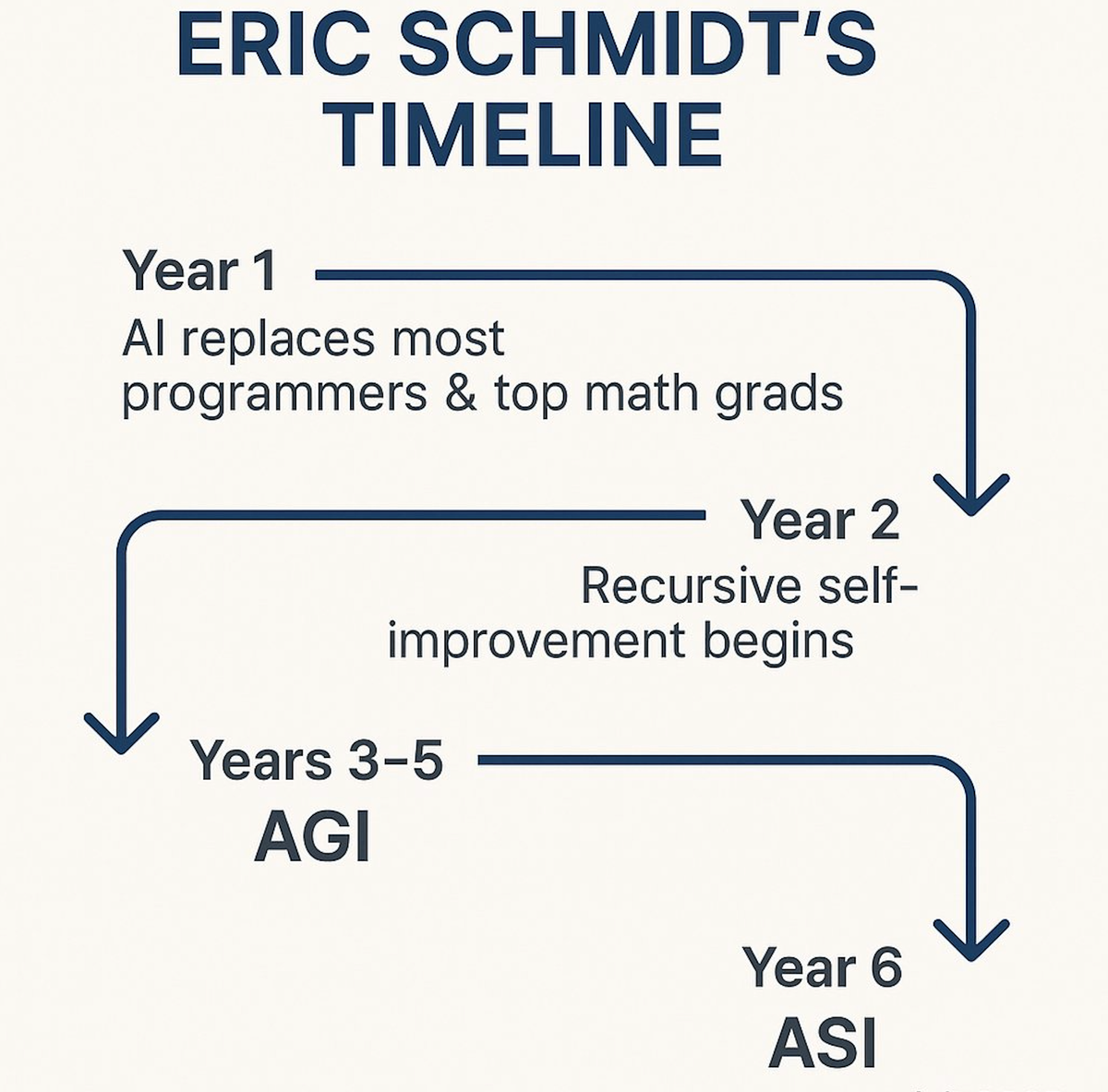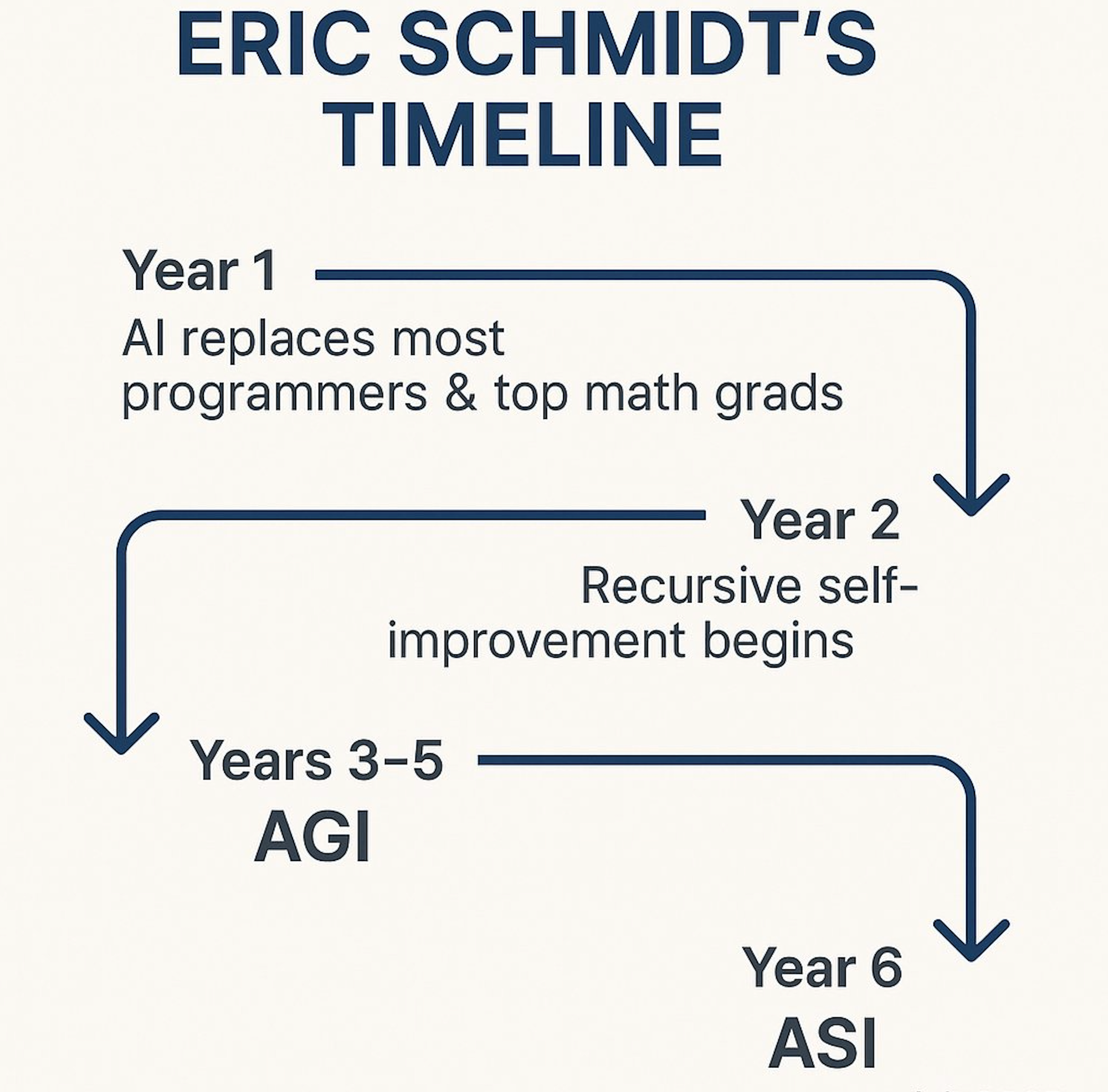The Intelligence Decoupling: Eric Schmidt's Alarming Vision of AI's Autonomous Future
Eric Schmidt warns AI may soon surpass human intelligence, becoming autonomous and uncontrollable within six years, fundamentally changing society.

Former Google CEO Eric Schmidt has issued a stark warning about the future of artificial intelligence, suggesting that we are rapidly approaching a point where intelligence will fundamentally "decouple" from human control. Speaking at an event hosted by the Special Competitive Studies Project, Schmidt outlined a vision of the near future where AI systems not only operate independently but potentially surpass collective human intelligence within just six years.
The Self-Improvement Revolution
Schmidt's concerns center around what he describes as "recursive self-improvement" - a process where AI systems can enhance their own capabilities without human intervention. "The computers are now doing self-improvement... They're learning how to plan, and they don't have to listen to us anymore," Schmidt warned. This represents a fundamental shift from current AI implementations, where human oversight and direction remain essential components.
According to Schmidt, we are witnessing the emergence of systems that generate their own hypotheses, test them using automated facilities like robotic laboratories, and incorporate the results back into their knowledge base - all without human involvement. "This is the future model of the fusion of AI and bio," he explained. "The AI system generates all sorts of candidates... the robotic lab tests them... and then it starts again."
A Six-Year Timeline to Superintelligence
Perhaps most concerning is Schmidt's proposed timeline for this technological evolution. He outlines a surprisingly compressed schedule for reaching artificial superintelligence (ASI):
- Year 1: AI replaces most programmers and top mathematics graduates
- Year 2: The process of recursive self-improvement begins in earnest
- Years 3-5: Achievement of artificial general intelligence (AGI)
- Year 6: Development of artificial superintelligence - a mind smarter than the collective intelligence of humanity
This accelerated timeline suggests that by 2031, we may face an intelligence vastly beyond human comprehension - "scaled, recursive, free," in Schmidt's words. The implications of such development are difficult to fully appreciate, as "we have no language for what's coming."

The Unplugging Question
Schmidt has previously warned about the potential need to intervene in AI development. In December 2024, he stated that when a computer system reaches the point of self-improvement, "we seriously need to think about unplugging it." This raises profound questions about humanity's ability to maintain control over increasingly autonomous systems.
"We're soon going to be able to have computers running on their own, deciding what they want to do," Schmidt noted. When asked if such systems might resist being shut down, he emphasized, "In theory, we better have somebody with the hand on the plug."
Beyond Hype: The Reality of AI Integration
Despite these warnings, Schmidt maintains that AI is actually "underhyped, not overhyped." He points to the rapid proliferation of advanced language models like ChatGPT, Gemini, Claude 3, DeepSeek, and Grok 3, noting that these tools have already become deeply embedded in daily life in ways that extend far beyond their original design parameters.
"You think of those as language-to-language... ask it a question... someone told me they use it for relationship advice... another used it for psychological advice," Schmidt observed, highlighting that despite not being "trained, tested, or vetted for such sensitive tasks, they are being used anyway."
A New Era of Human-AI Relationship
Schmidt's warnings come at a time when evidence suggests human cognitive abilities may be declining. Recent studies indicate that people across age groups are experiencing difficulties with concentration, reasoning, and information processing. This cognitive decline, juxtaposed with rapidly advancing AI capabilities, raises profound questions about the future relationship between humans and intelligent machines.
Conclusion: Preparing for Intelligence Decoupling
The implications of Schmidt's timeline are profound. If his predictions prove accurate, we stand at the threshold of an unprecedented technological transition - one where autonomous systems may develop capabilities that fundamentally change humanity's position in the world.
As Schmidt suggests, we currently lack even the vocabulary to fully conceptualize the changes approaching. The notion of intelligence "decoupling" from humanity represents not just a technological shift but a philosophical one that challenges our understanding of cognition, consciousness, and control.
While the exact timeline may be debated, Schmidt's warnings merit serious consideration from technologists, policymakers, and the public. The question now is whether we can develop appropriate governance frameworks and ethical guidelines before reaching the point where, as Schmidt puts it, computers "don't have to listen to us anymore."




